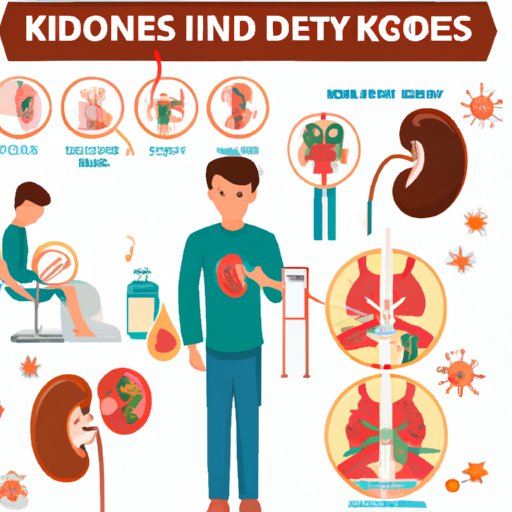
I. Introduction
Kidney infections occur when bacteria enter the kidneys and cause inflammation and infection. They can be painful and lead to severe complications if left untreated. In this article, we will explore the common symptoms, risk factors, and treatment options for kidney infections and how to prevent them.
II. Symptoms to Look Out For
Common symptoms of kidney infections include fever, chills, nausea and vomiting, lower back or side pain, frequent urination, burning sensation while urinating, and cloudy or smelly urine. Rare symptoms may include blood in urine, confusion, fatigue, and shortness of breath. Note that kidney infection symptoms are different from UTIs and bladder-related infections because they involve more severe symptoms and a high fever.
III. Risk Factors and Causes
You may be at higher risk of developing kidney infections if you have diabetes, a weakened immune system, or a history of UTIs. Other risk factors include pregnancy, urinary catheterization, structural abnormalities of the urinary tract, prostate enlargement, and using spermicidal agents.
IV. Prevention Tips
Preventing kidney infections is a matter of good hygiene and healthy habits. Drink plenty of water and urinate frequently, especially after sex. Wipe from front to back after using the bathroom, wear loose-fitting cotton underwear instead of tight synthetic clothes, and avoid using irritating feminine products. You can also try avoiding bladder irritants such as caffeine, tobacco, and alcohol.
V. Diagnosis
If you suspect you have a kidney infection, see a doctor immediately. They will review your medical history, perform a physical examination, and order various tests to confirm the diagnosis. This may include a urine test, blood test, imaging, or diagnostic procedures such as cystoscopy. These tests help identify the presence of bacteria and determine the extent of the infection.
VI. Treatment Options
Treating kidney infections typically involves the use of antibiotics that target the bacteria causing the infection. Usually, a minimum of 10-14 days of antibiotics and close monitoring of symptoms is required to ensure complete recovery. Besides medication, patients can receive pain management and intravenous fluids if they become dehydrated. In severe cases, hospitalization may be required for intensive treatment.
VII. Long-Term Outlook
If left untreated, kidney infections can lead to severe complications like kidney damage, sepsis, and even death. Hence, it is essential to identify and treat kidney infections early. Some patients may experience long-term complications such as recurrent infections or chronic kidney disease. If you have a weakened immune system or structural abnormalities, you may be at risk of recurrent infections, which can affect the long-term health of your kidneys.
VIII. Conclusion
Kidney infections can be very painful and lead to severe complications if left untreated. However, they can be easily prevented by adopting healthy habits and proper hygiene methods. It is crucial to seek medical attention if you experience any symptoms mentioned above. Early diagnosis and prompt treatment is the best way to prevent complications and ensure a speedy recovery.




